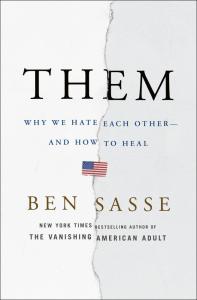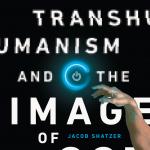
I recently finished reading Ben Sasse’s latest book Them: Why We Hate Each Other–And How To Heal. There will be a longer review to follow, probably cross-listed from an academic review site. (Like this.)
The short review is this: Them is excellent and you should read it. Senator Sasse takes de Tocqueville’s argument that the glue that binds America together is really our involvement in local associations and networks of small clubs and applies said argument to our current political situation. It’s a more complicated book than that, of course, but that’s the short version.
Again, there’s a lot to say about that politically, but one thing that occurred to me a few times while reading this book is the question of just what this means for the church. Specifically, what does it mean when the church is one of the few binding organizations left in the United States in any widespread or meaningful sense? Sure, there are still the odd Rotary Clubs or Moose Lodges or Masonic Temples here and there, but involvement in these sorts of institutions is both increasingly sporadic and aging. Only churches have some kind of regular presence most places around the country, even if it is a combination of spiritually dead mainline churches and shallow/fluffy Evangelical ones.
And yet, if Sasse (and de Tocqueville before him) are right, then these churches and remaining public associations are important to restoring our basic decency and civil public discourse. When Republicans and Democrats, conservatives and liberals, progressives and traditionalists, all sit next to each other in a worship service, they begin to have bonds that run deeper than our national political divisions. It’s one thing to hate someone you never know personally in real life, whether because you only ever encounter them on the internet or because they live next door (but you have no meaningful interactions with them). It’s another to hate someone you volunteer with, sing with, or see on a regular basis.
Anyway, the question that sprang to mind while reading through this book is: do we have obligations as Christians to flex our associational muscles and put our organizations to work for the good of broader society? Should we become training grounds for a renewed and restored decent America? That is, should we do this intentionally?
Once we’ve added that word “intentionally,” I think we’ve got our answer by definition. Churches, especially churches that still preach the historic Gospel, are to do what we do not out of patriotic duty or service to the country; that would be making Caesar our primary focus. Instead, we are to do church the way the Bible tells us to because it’s the way the Bible tells us to, for the glory of God rather than for the good of the state. Liberals and conservatives, Republicans and Democrats, et al should sit next to each other in worship and form deeper bonds than mere partisan bickering allows not because it’s good for the country, but because it reflects the deeper union we have in the Gospel. If the state happens to benefit from our work and unity as Christians, so be it. If it is somehow damaging to the state, well, that’s too bad for the state. But that benefit should not be our primary reason for unity in the first place (and if there were damage to the state being done, that likewise would not be a good reason for failing to obey the commands of Scripture).
In fact, here’s where we could insert the C.S. Lewis line about first things and second things and gaining the second things when you pursue the first things, but losing both when you pursue the second things. But this snippet of a review has gone on long enough. The big takeaway is that Christians do church because God has told us to, not out of service to Caesar. Which isn’t to say that Them has no value–far from it! It’s an excellent book and I encourage you to pick it up and read it.
Dr. Coyle Neal is co-host of the City of Man Podcast and an Associate Professor of Political Science at Southwest Baptist University in Bolivar, MO













